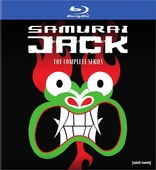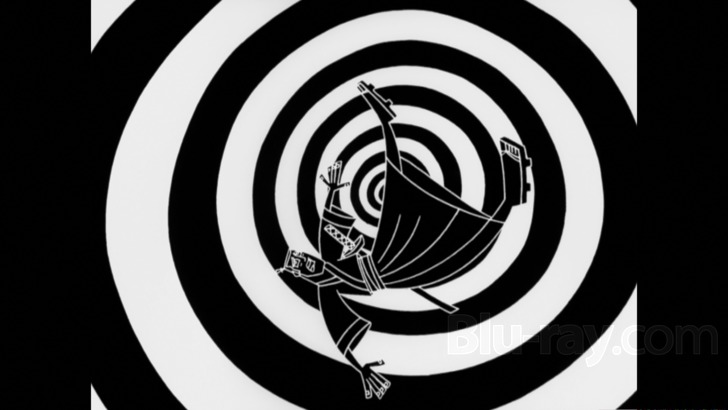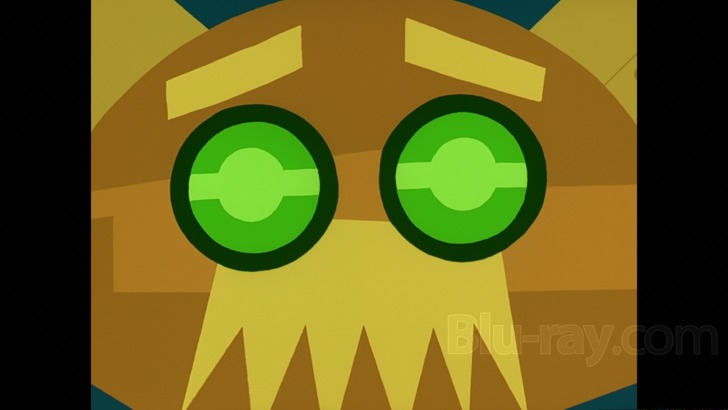Samurai Jack: The Complete Series Blu-ray Movie
HomeSamurai Jack: The Complete Series Blu-ray Movie 
Warner Bros. | 2001-2017 | 5 Seasons | 1364 min | Rated TV-14 | Oct 17, 2017
Movie rating
8.4 | / 10 |
Blu-ray rating
| Users | 3.5 | |
| Reviewer | 4.0 | |
| Overall | 3.5 |
Overview
Samurai Jack: The Complete Series (2001-2017)
| Animation | 100% |
| Fantasy | 74% |
| Adventure | 50% |
| Action | 38% |
| Martial arts | 38% |
Specifications
Video
Video codec: MPEG-4 AVC
Video resolution: 1080p
Aspect ratio: 1.78:1, 1.33:1
Original aspect ratio: 1.78:1, 1.33:1
Audio
English: Dolby Digital 2.0 (192 kbps)
English: Dolby Digital 5.1 (384 kbps)
Subtitles
English SDH
Discs
Blu-ray Disc
Five-disc set (5 BDs)
Playback
Region A, B (C untested)
Review
Rating summary
| Movie | 4.5 | |
| Video | 4.5 | |
| Audio | 2.5 | |
| Extras | 3.0 | |
| Overall | 4.0 |
Samurai Jack: The Complete Series Blu-ray Movie Review
Reviewed by Jeffrey Kauffman November 8, 2017The commentary on the new ClassicFlix Blu-ray release of the venerable noir He Walked by Night mentions how the cast features two stalwarts of sixties Irwin Allen television efforts, though only one of the actors got more than a season’s work out of the gig. He Walked by Night’s titular villain is played by Richard Basehart, who despite a long and rather storied film career that included appearances in outright classics like Federico Fellini’s La strada, is still probably best remembered (at least by Baby Boomers) for his multi-year stint aboard the Seaview in what was arguably Allen’s most successful television enterprise, Voyage to the Bottom of the Sea. Character actor Whit Bissell, whose name may not be all that familiar but whose face will be instantly recognizable to many film (and television) fans, didn’t fare nearly so well in his Irwin Allen enterprise, the “one season wonder” The Time Tunnel. Despite only lasting a single season, one of The Time Tunnel’s unexpectedly long lasting iconic images was of its titular “character”, a swirling tube featuring concentric black and white rings that were probably intentionally hypnotic looking when they kicked into motion and transported the series’ two heroes to various eras (mostly in the past). That very image may well have served as inspiration for Samurai Jack creator Genndy Tartakovsky, for when this show’s titular character is sent packing through time by a shape shifting ogre named Aku, he does so in a very Time Tunnel-esque fashion (see the first screenshot accompanying this review), though in this case Jack ends up in a distant dystopian future where Aku has completely taken over. There’s a different kind of “time travel” involved in Samurai Jack from a production standpoint, for the series had a rather fascinating broadcast history which saw it unfold for three years (more or less, anyway) between 2001 and 2004, before returning almost a decade and a half later for a “wrap up” season that sought to close a number of plot strands that had been left hanging when the first run perhaps prematurely came to a close.

Samurai Jack is the brainchild of Genndy Tartakovsky, a Russian born emigré whom animation fans have come to admire for his work not just on this show, but also Dexter's Laboratory (which had at least a somewhat similar design aesthetic to The Powerpuff Girls, another show on which Tartakovsky worked). Tartakovsky was also involved with Star Wars: Clone Wars and he also helmed the big screen Hotel Transylvania and its follow up Hotel Transylvania 2. All of this experience highlights Tartakovsky’s versatility, but despite the manifest differences between all these properties, they share one thing that Samurai Jack also has in abundance — a nearly nonstop visual virtuosity that is quite arresting and which references suitably Asian motifs that are often seen in things like old etchings.
That incredibly distinctive design aesthetic is on tap from the get go, in the series’ pilot episode which quickly elides a bunch of quasi-mythological information as it details the escape of arch demon Aku, who takes Jack’s father prisoner, leaving Jack and his mother to fend for themselves. A quick montage documents Jack’s upbringing around the world, where he interacts with various historical characters and learns a number of fighting techniques. Armed with his father’s magical katana, Jack (who is in fact nameless — more about that in a moment) decides to take on Aku, which is when the nefarious villain teleports Jack eons forward in time to an era when Aku is firmly in charge — of everything. It’s the first lunatic characters that the samurai encounters in this future world who nickname him “Jack”, and despite Jack’s befuddlement as to what’s happened to him (or perhaps more accurately, when’s happened to him), he launches into attack and/or protector mode almost immediately.
The basic “plot” of Samurai Jack is not very complex, focusing on Jack’s ongoing skirmishes with Aku, while Jack also tries to (in the words of the theme song) “get back” to a time before Aku controlled everything. What really propels this often fascinating series is its vignette laden structure which repeatedly brings Jack into contact with all sorts of bizarre creatures. Even this element, as compelling as it typically is, often takes a back seat to the sheer wonderment of the animation styles on display. This is an incomparable looking series, one which combines elements in a completely unique way and which in fact is so visually alluring that often times whole sequences play out with hardly a word of dialogue.
The long disruption between the first four seasons and the final fifth season actually doesn't seem as disjunctive as might be assumed when binge watching this show (and it's a salient point to recognize that this is a series that doesn't lose much from binge watching). While the basic story arc of Jack has been consistently interesting, if kind of on "one track" (i.e, "getting back"), the final season actually injects some unexpected emotion into the proceedings, with a seemingly happily ever after conclusion kind of wrestled into something a bit more melancholy and therefore realistic.
Samurai Jack: The Complete Series Blu-ray Movie, Video Quality 

Samurai Jack: The Complete Series is presented on Blu-ray courtesy of Warner Brothers with an AVC encoded 1080p transfer in 1.33:1 (for
the first four seasons) and 1.78:1 (for the fifth and final season). This is a pretty remarkable upgrade from the previously released DVDs, though it
looks like some elements from the first episodes, including the title sequence (which recurs thereafter) have at least some moments that have been
upscaled, so that eagle eyed viewers may catch some quick moments of relatively minor stairstepping and the like. Other than this anomaly, and a
kind of strange softness that accrues in some of the fourth season episodes, I can't imagine fans of this series not enjoying the presentation here. Line
detail is sharp and precise looking, and the series' wonderfully diverse animation styles are rendered with clarity and a refreshing lack of issues like
banding. The palette of Samurai Jack is continually appealing, and widely variant (perhaps part of its appeal), and the color space across the
five Blu-ray discs is continually quite impressive.
Note: I've arranged the screenshots "by season" in the following manner:
- Season 1: Screenshots 1, 6, 11, 16
- Season 2: Screenshots 2, 7, 12, 17
- Season 3: Screenshots 3, 8, 13, 18
- Season 4: Screenshots 4, 9, 14, 19
- Season 5: Screenshots 5, 10, 15, 20
Samurai Jack: The Complete Series Blu-ray Movie, Audio Quality 

Unfortunately, the news is less spectacular with regard to the audio on this release. I'll state up front that there's nothing really "wrong" with either the Dolby Digital 2.0 mixes on the first four seasons, or the Dolby Digital 5.1 mix on the fifth and final season, but why a release of this assumed popularity is being offered with only lossy audio this far into the high definition era is a bit of a head scratcher. I personally found the amplitude on the first four seasons a bit on the anemic side, resulting in me boosting my volume a bit higher than I typically do, but with that said, all elements come through clearly enough, if often without much sonic "oomph". Things improve at least marginally on the fifth season, and the surround track does provide regular immersion courtesy of both the often evocative score choices, but also the glut of effects that attend Jack's adventures (not necessarily only with regard to Aku). My 2.5 score is a bit of a "protest" vote to register my personal displeasure that lossless audio was not included on this release, but at least rest assured that I encountered nothing truly problematic on the lossy tracks included here.
Samurai Jack: The Complete Series Blu-ray Movie, Special Features and Extras 

Disc One (Season One)
- Creator Commentary Episode VII features Genndy Tartakovsky and Bryan Andrews.
- The Making of Samurai Jack (1080p; 7:10) is a decent if awfully brief overview of the genesis and production of the series.
- The Pitch (1080i; 7:11) documents the production ethos of the show, one which preferred storyboards to scripts.
- Genndy's Scrapbook (1080i; 21:14) is a really nice piece profiling Tartakovsky and his unique style of art.
- Creator Commentary Episode XXV features Genndy Tartakovsky, Bryan Andrews and Scott Wills (who won an Emmy for this episode).
- The Martial Arts of Samurai Jack (1080p; 12:13) is a fun piece documenting how Samurai Jack's animated fight moves are based on real life techniques.
- Lost Artwork Gallery (1080i; 4:56) offers Genndy Tartakovsky commenting on previously unseen artwork.
- The Evolution of Jack! (1080p; 13:45) does look at how the character has changed, but which really serves as more of a generalist overview of the final season.
- Pitch Movie XCIV (1080i; 28:34)
- Pitch Movie XCVI (1080i; 35:38)
- Pitch Movie XCVIII (1080i; 35:27)
- Pitch Movie XCIX (1080i; 27:17)
- Pitch Movie C (1080i; 24:25)
The set comes housed in a sturdy chipboard slipbox which also includes a frankly pretty cool scene of Samurai Jack battling Aku printed on a metal plate. Digital codes are also included for streaming.
Samurai Jack: The Complete Series Blu-ray Movie, Overall Score and Recommendation 

From a plot standpoint, Samurai Jack is almost willfully minimalist, but from a visual presentation standpoint, this is one of the most audaciously hyperbolic offerings I can personally remember in the last couple of decades of television animation. Filled with wonderfully bizarre characters and continually outré vignettes, Samurai Jack also manages to actually touch actual real human emotions at unexpectedly regular intervals. I'm personally displeased that this release only offers lossy audio (I'm a huge fan of the soundtrack), but otherwise, Samurai Jack: The Complete Series comes Highly recommended.
Other editions
Samurai Jack: Other Seasons

Samurai Jack: The Complete First Season
2001

Samurai Jack: The Complete Second Season
2002

Samurai Jack: The Complete Third Season
2002-2003

Samurai Jack: The Complete Fourth Season
2003-2004

Samurai Jack: The Complete Fifth Season
2017
Similar titles
Similar titles you might also like

Avatar - The Last Airbender: The Complete Series
2005-2008

The Legend of Korra: The Complete Series
2012-2014

Genndy Tartakovsky's Primal: The Complete Second Season
2021-2022

Jiang Ziya
Legend of Deification / 姜子牙
2020

Wizards
35th Anniversary Edition
1977

War of the Worlds: Goliath 3D
2012

The Legend of Zelda
1989

Mortal Kombat Legends: Scorpion's Revenge
2020

Phantom Boy
2015

Mortal Kombat Legends: Battle of the Realms
2021

Long Way North
Tout en haut du monde
2015

Battle for Terra
2007

The Super Mario Bros. Super Show!
1989

Castlevania: Season Four
2021

The Legend of Hei
罗小黑战记 / Luo Xiaohei Zhan Ji
2019

Adventure Time: Distant Lands
2020-2021

Dragon Age: Dawn of the Seeker
2012

Over the Garden Wall
2014

Star Wars: The Clone Wars - Feature Film
2008

Justice League: Crisis on Infinite Earths, Part One
2024